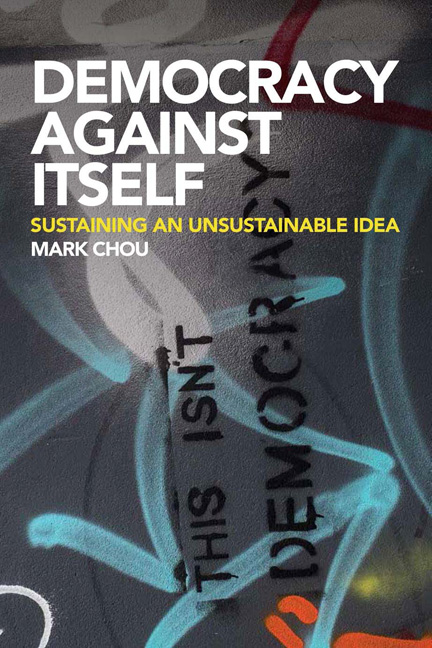Book contents
- Frontmatter
- Contents
- Introduction
- 1 Democracy Against Itself
- 2 Democracy in Athens: Autonomy, Tragedy and Decline
- 3 Democide in Weimar: Militant Democracy and the Paradox of Self-Defence
- 4 The Coming Authoritarianism: The State of America's Democracy
- 5 China's New Authoritarianism: A Glimpse at Our Post- Democratic Future?
- 6 Occupy Democracy: Democracy Against Itself and the Global Occupy Movement
- Bibliography
- Index
5 - China's New Authoritarianism: A Glimpse at Our Post- Democratic Future?
Published online by Cambridge University Press: 07 December 2017
- Frontmatter
- Contents
- Introduction
- 1 Democracy Against Itself
- 2 Democracy in Athens: Autonomy, Tragedy and Decline
- 3 Democide in Weimar: Militant Democracy and the Paradox of Self-Defence
- 4 The Coming Authoritarianism: The State of America's Democracy
- 5 China's New Authoritarianism: A Glimpse at Our Post- Democratic Future?
- 6 Occupy Democracy: Democracy Against Itself and the Global Occupy Movement
- Bibliography
- Index
Summary
The word of hope on which the last chapter ended is poignant and worth repeating. Even though democratic America is in crisis – some would say a crisis of its own making – there is no denying that the United States remains the world's leading example of what a democracy should look like. That aside, as Johnston reminds us toward the end of the last chapter, democracy is a resilient and resistant species. It is important not to forget that even as political forecasters like Wolin and Giroux point to its less sanguine future.
Yet far from forgetting, it seems that many refuse to even entertain the thought that democracy is in crisis at all. Against the type of evidence outlined in the previous chapter, many democrats in America have habitually thought that their democracy's future is assured. They think that, however flawed and inverted their democracy is, America will not likely follow the path of Athens or Weimar. And they may be right. But the question we need to ask ourselves is what will a democracy like America's become if it continues on the trajectory that a Wolin or Giroux has outlined? If not Athens or Weimar, what will be the end product of America's coming authoritarianism? Of course, both Wolin and Giroux have already provided answers to this question in their own ways. We have seen what the looming authoritarianism means in their analysis. Yet as convincing as their prognoses are, they suffer from the defect that neither analysis is complete. Symptomatic of the fact that America's coming authoritarianism is still in many ways yet to come – i.e. the fate of democracy has not yet been sealed – we have no concrete example or blueprint of what inverted totalitarianism will look like when or if it ever blossoms. Wolin's and Giroux's portrait of an America rushing headlong into something sitting between traditional conceptions of democracy and authoritarianism is both atypical and beyond simplistic categorisations. There is nothing that really resembles inverted totalitarianism; it is its own unique beast.
- Type
- Chapter
- Information
- Democracy Against ItselfSustaining an Unsustainable Idea, pp. 110 - 138Publisher: Edinburgh University PressPrint publication year: 2014



